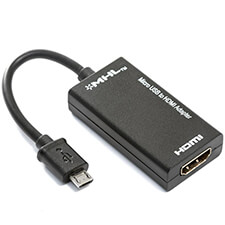MHL
Stands for "Mobile High-definition Link." MHL is a technology designed for connecting mobile devices, such as smartphones and tablets, to TVs, displays, home theater systems, and automotive interfaces. It was developed and standardized by multiple companies that make up the MHL Consortium. These include Nokia, Samsung, Sony, Toshiba, and Lattice Semiconductor.
An MHL connection provides three primary functions:
- It transmits a full HD audio and video signal
- It provides electrical power to mobile devices
- It supports RCP data transmissions
1. HD Signal
The HD connection allows a smartphone or tablet to mirror its screen content on an HDTV in full resolution with almost no latency. The MHL 1 and MHL 2 standards support a maximum resolution of 1080p at 60 FPS. This makes it possible to play movies and games from a mobile device on an HDTV with no lag. MHL 3 supports 4K resolution at 30 FPS. A new variation of the standard, called superMHL, supports 8K video at 120 FPS. All MHL technologies support 8-channel high-definition audio.
2. Power
When an MHL-compatible device is connected to a TV or other hardware that supports MHL, it can receive electrical power at up to 10W (MHL 3) or 40W (superMHL). Therefore an MHL connection can be used to charge a mobile device and will prevent it from running out of power during a video or gaming session.
3. Data Transmission
The MHL standard supports data transmissions over the Remote Control Protocol (RCP). This means it can send and receive messages, such as play, pause, volume up/down, and other commands. RCP support means you can use your television remote to control your MHL-connected device.
MHL Interface
There is no such thing as an MHL cable. Instead, MHL operates over existing connectors. Android smartphones commonly have Micro-USB ports while TVs and other A/V devices often have HDMI ports. Therefore, an MHL-compatible Micro-USB to HDMI adapter is commonly required to connect the two devices. superMHL also supports USB-C, which provides more bandwidth than a Micro-USB cable.
 Test Your Knowledge
Test Your Knowledge